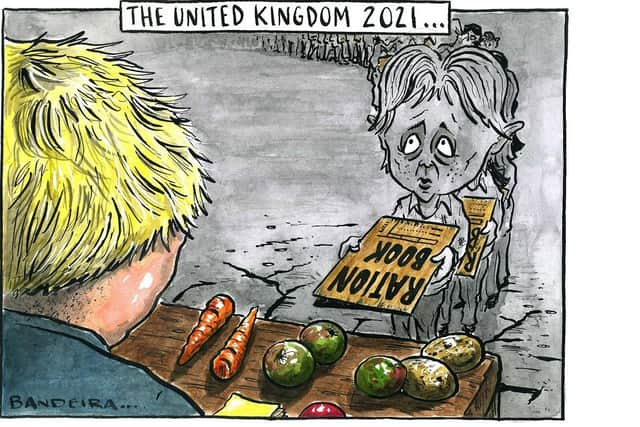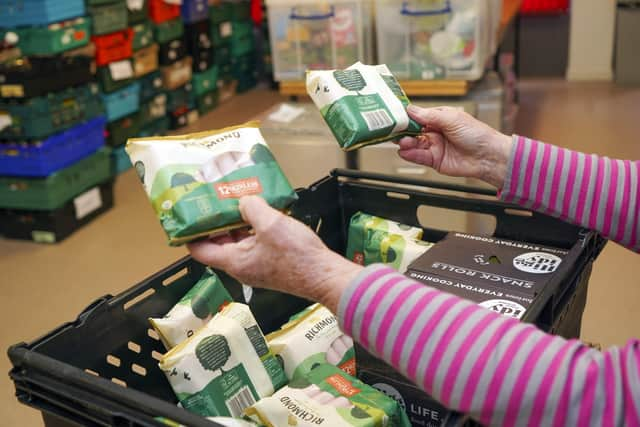Blame politicians and not the poor for child food poverty – Sarah Wilson
The images rightly sparked outrage in many – and condemnation even from the Department for Education which subcontracted the deliveries themselves – but a cursory glance at the comments section beneath the published photos reveals an altogether different attitude.
“Rations aren’t supposed to be luxurious...say thank you and get a job if it’s not enough,” reads one top-rated comment beneath a tabloid story on the parcels. “Parents who scrounge and don’t work shouldn’t be having children,” reads another.
Advertisement
Hide AdAdvertisement
Hide AdThe inherently detached nature of interactions on social media is at least partly to blame for keyboard warriors of this ilk, but it’s not altogether surprising when one considers the decades-worth of benefits-bashing laid on thick by the British tabloid press and more brash TV programmes.


Alongside exploitative shows like Jeremy Kyle and heavy-handed “documentaries” amounting to poverty porn, an image has emerged of welfare recipients as lazy, workshy cheats who are poor because they fritter their children’s lunch money on unnecessary “flat-screen TVs” and “smartphones”. Poverty, we’re told, is a personal failing.
In reality, there are any number of life circumstances that can lead to poverty: insecure work; job loss; care requirements; sudden illness; a death in the family. Around half of working renters, in fact, are estimated to be just one paycheck away from homelessness.
Solid, quantitative evidence has shown that poor households do not generally buy so-called “temptation goods” like alcohol and tobacco with money from the state. Smartphones are often a person’s only source of internet access, while you’d today be hard-pressed to find even a second-hand TV that was not a “flatscreen”; hardly, in 2021, worthy of being classed “luxuries”.
Advertisement
Hide AdAdvertisement
Hide AdNonetheless, the depressing myth of the benefits “scroungers” lives on, perhaps most starkly at work in the comments of those who insist that the paltry offerings given to families are perfectly adequate to provide a bare minimum of nutrition.


In their mean-spirited suggestion that a plain boiled potato, crisps and half an apple would be nutritious and filling enough to get a child through the day, they betray not only a deep lack of empathy and understanding, but an even more insidious viewpoint: that the poor are not deserving of favour.
The irony of the comparison so often made between free school meals and war rationing lies in the fact that the horrors of the Second World War led to the creation of the very welfare system people are now so vilified for using. So derided has the idea of “relying” on welfare become that, were the NHS invented today, it’s easy to imagine it being sneered at as a “freebie” for those burdening the state.
Individual choices will always have a role to play in one’s material circumstances, but with 14 million people in the UK – including four million children – in poverty, it is disingenuous and downright cruel to lay the blame at the door of the poor.
Advertisement
Hide AdAdvertisement
Hide AdThe eagerness with which some do so isn’t only an alarming indicator of an unempathetic society, but a convenient get-out for those in power.


For politicians, it’s a gift for poverty to be viewed as a chosen condition, one easily alleviated by “sensible” spending and getting a job; never mind the reality that four million of those in poverty are already working.
The very fact that Marcus Rashford, a 23-year-old footballer, feels more compelled to act on poverty than our elected politicians exposes a deep lack of accountability among the latter.
When the blame for poverty is laid at the door of those experiencing it, those in power are able to dodge scrutiny for the array of political decisions that have led to today’s poverty crisis: soaring living costs with stagnating wages, insecure work and relentless cuts to public assets – schools, libraries and early education – that boost social mobility.
Advertisement
Hide AdAdvertisement
Hide AdThe people bearing the brunt of these forces, so often out of their control, deserve empathy – especially at a time when the pandemic has made life harder than ever before.
When it comes to poverty, our judgment should lie squarely with the people in power who have failed, time and again, to tackle an issue blighting the lives of millions.
Sarah Wilson is a Senior Digital Journalist with JPI Media and The Yorkshire Post.
Support The Yorkshire Post and become a subscriber today. Your subscription will help us to continue to bring quality news to the people of Yorkshire. In return, you’ll see fewer ads on site, get free access to our app and receive exclusive members-only offers. Click here to subscribe.
Comment Guidelines
National World encourages reader discussion on our stories. User feedback, insights and back-and-forth exchanges add a rich layer of context to reporting. Please review our Community Guidelines before commenting.